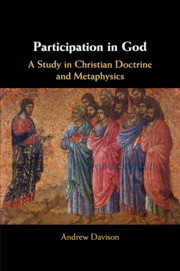Book contents
- Participation in God
- Participation in God
- Copyright page
- Dedication
- Epigraph
- Contents
- Acknowledgements
- Works of Thomas Aquinas: Texts, Translations, and Abbreviations
- Introduction
- I Participation and Causation
- II The Language of Participation and Language as Participation
- III Participation and the Theological Story
- IV Participation and the Shape of Human Life
- 13 Truth
- 14 Beauty
- 15 Goodness
- Conclusion
- Bibliography
- Index of Names
- Subject Index
- Index of Biblical References
- Index of Works of Aquinas
15 - Goodness
Ethics
from IV - Participation and the Shape of Human Life
Published online by Cambridge University Press: 15 August 2019
- Participation in God
- Participation in God
- Copyright page
- Dedication
- Epigraph
- Contents
- Acknowledgements
- Works of Thomas Aquinas: Texts, Translations, and Abbreviations
- Introduction
- I Participation and Causation
- II The Language of Participation and Language as Participation
- III Participation and the Theological Story
- IV Participation and the Shape of Human Life
- 13 Truth
- 14 Beauty
- 15 Goodness
- Conclusion
- Bibliography
- Index of Names
- Subject Index
- Index of Biblical References
- Index of Works of Aquinas
Summary
This chapter on participation in goodness, and on ethics or a good life, has been prepared for by the previous chapter, on beauty and desire. Like the chapter on truth and epistemology before that, this chapter on goodness is robustly realist: it sees what would be morally good for a person, community, or situation to align with the reality and good of the thing considered, which it has by participation in God. The twin focuses here are virtue ethics (which is explored in terms of the alignment of the good-as-moral with the good-as-excellent) and natural law (which is explored in terms of the alignment of the good-as-moral with the good-as-beneficial). No firm wedge, however, is driven between those two approaches, which are both related to God as source and goal in participatory terms. The chapter moves to a discussion of the expectation of the coherence of the good in a participatory framework, such that the goodness that creatures have (and, here, especially human beings) is expected naturally to align with the nature of the good as communicated, for instance, in revelation. This is explored in contrast with the thought of John Duns Scotus. The chapter ends with a participatory discussion of the nature of law in its various forms, including the participatory and theological backdrop to notions of international law.
Keywords
- Type
- Chapter
- Information
- Participation in GodA Study in Christian Doctrine and Metaphysics, pp. 348 - 366Publisher: Cambridge University PressPrint publication year: 2019



